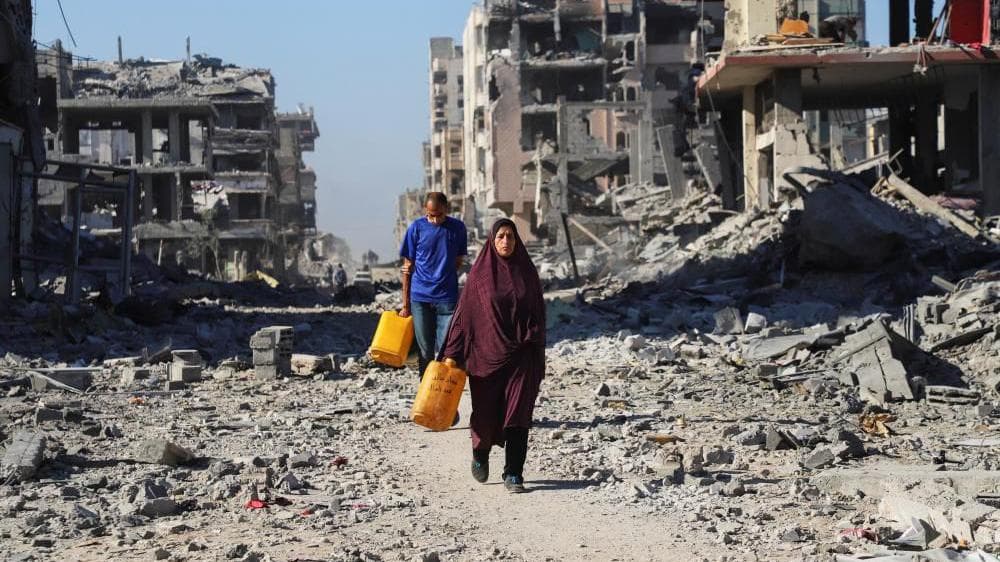We're loading the full news article for you. This includes the article content, images, author information, and related articles.
Humanitarian agencies and the United Nations are urging Israel to open additional entry points into Gaza, including to the devastated northern region, to facilitate a massive surge of aid crucial for hundreds of thousands of Palestinians.

Humanitarian agencies and the United Nations are intensifying calls for Israel to open more border crossings into the Gaza Strip, stressing the urgent need for a dramatic increase in aid to the besieged territory. This appeal comes as preparations are underway for convoys to enter through the southern Rafah crossing with Egypt on Thursday, October 16, 2025, marking the first such access through this critical entry point since May last year.
Tom Fletcher, the UN Under-Secretary-General for Humanitarian Affairs and Emergency Relief Coordinator, emphasised the necessity for a "massive surge of humanitarian aid – on which so many lives depend, and on which the world has insisted." He highlighted that facilitating aid is a legal obligation, not a bargaining chip.
The humanitarian situation in Gaza has been described as unbearable and sharply deteriorating, with the entire population facing high levels of acute food insecurity. The current efforts to increase aid flow follow a ceasefire agreement, which has allowed some relief and the return of hundreds of thousands of people to northern Gaza. However, many returning residents are finding their homes and infrastructure destroyed, often living in makeshift shelters with limited access to food or water.
The Rafah crossing, the sole entry point between Egypt and the Gaza Strip not controlled by Israel, has historically seen intermittent openings. Israel took control of the Rafah Border Crossing in May 2024 during the Gaza war, withdrawing in January 2025 as part of a ceasefire agreement, but later reoccupied it in March 2025. The current reopening for people to cross is part of a broader peace plan.
The UN and aid agencies consistently reiterate that Israel has clear international legal obligations to cooperate with humanitarian efforts and ensure unimpeded access to Gaza. This includes upholding the 1946 Convention on the Privileges and Immunities of the United Nations and international humanitarian law. The withholding of aid from civilians is explicitly stated as not being a bargaining chip.
Aid agencies report thousands of tonnes of supplies, including food and medical provisions, are currently waiting in Egypt or stockpiled in the region. An international aid worker, recently returned from Gaza, stated, "We have the supplies, the tools and the skills… We just need the access." The UN's Tom Fletcher has also called for over 50 international NGOs, including Oxfam and the Norwegian Refugee Council, to be allowed to bring in aid, emphasizing that their presence is crucial for delivering aid at the necessary scale.
Despite the ceasefire, significant challenges remain for aid distribution, particularly in Gaza City and its northern surroundings, which are the areas worst hit by hunger. Roads are often impassable due to massive destruction or remain under Israeli control. The closure of Zikim, a main entry point to the north, for several weeks, further exacerbates the problem, with no immediate plans for its reopening. The lack of sufficient aid and access could lead to increased looting and further displacement as people seek areas with more assistance.
While the Rafah crossing is expected to open for people on Thursday, October 16, 2025, the specific restrictions on those seeking to cross remain unclear. There have also been previous delays in opening the crossing due to disputes, such as Israel's accusation that Hamas was slow in returning the bodies of hostages.
Preparations are ongoing for the Rafah crossing to open on Thursday, October 16, 2025, for the exit and entry of Gazans. The European Union is on standby to deploy a humanitarian mission (EUBam) at the Rafah crossing if conditions improve. The Palestinian Authority has also expressed its readiness to operate the crossing.
The international community will be closely watching the sustained opening of the Rafah crossing and the potential opening of additional entry points, especially to northern Gaza. The ability of international NGOs to resume full operations and the overall scale of aid reaching those in desperate need will be critical indicators of progress. Continued efforts to ensure the safe, voluntary, and dignified return of Palestinians to their homes, coupled with comprehensive humanitarian assistance, will be paramount.
Keep the conversation in one place—threads here stay linked to the story and in the forums.
Sign in to start a discussion
Start a conversation about this story and keep it linked here.
Other hot threads
E-sports and Gaming Community in Kenya
Active 9 months ago
The Role of Technology in Modern Agriculture (AgriTech)
Active 9 months ago
Popular Recreational Activities Across Counties
Active 9 months ago
Investing in Youth Sports Development Programs
Active 9 months ago